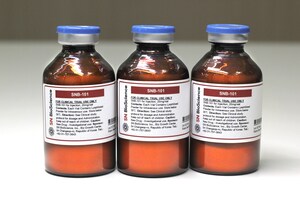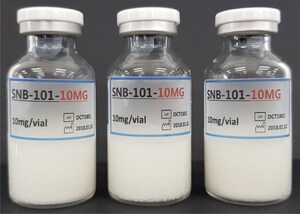SEOUL, South Korea, May 31, 2024 /PRNewswire/ -- SN Bioscience Co., Ltd. (CEO Park Young-hwan) announced on May 24 that European Medicines Agency(EMA) had granted an orphan drug designation for small cell lung cancer(SCLC), a rare disease, for SNB-101 (API: SN-38) which is a new polymer nanoparticle drug under development.
SNB-101 is the world's first nanoparticle anticancer drug that has been developed extremely insoluble SN-38 into polymer nanoparticles. The nano micelle technology, a core platform technology of SN Bioscience, has been applied, and it is expected to significantly improve the therapeutic effects and reduce side effects over existing treatments.
Irinotecan, commonly used in anticancer treatment, shows anticancer effects, but it converts only about 5% of the total dose into the active form SN-38 when administered to the human body. Irinotecan that is not converted has the disadvantage of causing side effects.[1]
SCLC accounts for 15~25% of all lung cancers with a very poor prognosis. The current standard treatment (first-line treatment) is classic drugs, Cisplatin + Etoposide. However, as there are very limited options for second-line treatment and others, it is an area with very high medical unmet needs.
Orphan drug designation from EMA allows companies certain benefits, including a type of scientific advice specific for designated orphan medicines, protocol assistance, financial incentives for product approvals, and exclusive rights for 10 years from the date of marketing approval.
Meanwhile, SNB-101 was also designated as an orphan drug by the FDA for SCLC in July 2023 and for pancreatic cancer in February 2024. Additionally, in May 2024, the FDA granted Fast Track designation to SNB-101 for SCLC.
By receiving an orphan drug designation from EMA following FDA, it is expected that the expansion of indications and clinical development for SNB-101 will gain momentum.
About SN BioScience Inc.
SN Bioscience is a drug delivery system R&D company specialized in anti-cancer drugs. From the beginning of its establishment, it has focused on "commercialization" and has been developing nanoliposomes and nanoparticle drug carriers based on pharmacometrics and pharmacokinetics.
SNB-101
SNB-101 is expected to be effective in lung cancer, pancreatic cancer, and gastric cancer, which were not the indications previously. Scale-up production, the biggest barrier that prevented existing nano-cancer drugs from entering the clinical stage, was successful, and clinical trial products are produced at a facility dedicated to anticancer drugs with EU GMP certification. In Korea, IND for a phase 2 clinical trial was approved in September last year, and the IND for a phase 2 clinical trial to the U.S. FDA is to be filed in July this year.
SOURCE SN BioScience Inc

WANT YOUR COMPANY'S NEWS FEATURED ON PRNEWSWIRE.COM?
Newsrooms &
Influencers
Digital Media
Outlets
Journalists
Opted In






Share this article